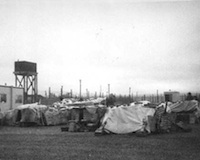
Hundreds of republicans remained interned without trial in the early 70s because the British authorities manipulated the so-called review process, according to newly discovered documents.
A classified British Ministry of Defence record of exchanges shows that only cases likely to be rejected were referred for review.
The minutes -- taken by Lt Col David Ramsbotham, who later became chief inspector of British prisons -- were found in the National Archives at Kew in London by researchers from the Pat Finucane Centre, a Derry-based human rights group.
In the aftermath of the Saville inquiry into the Bloody Sunday shootings, the documents have raised concerns about British efforts to conceal human rights abuses in the early 1970s, policies which became the template for much of its “anti-terror” legislation and policy.
The minutes detail a meeting between the British Army’s Chief of the Imperial General Staff, then Michael Carver, and the Permanent Under Secretary at the Ministry of Defence, then Frank Cooper, held in London on 14 June 1973.
At that stage more than 400 republicans were being held at Long Kesh, and other sites.
In 1972, a commission was set up to consider evidence against detainees.
According to the notes, Cooper said: ““The review procedure now existed and was fair. They had succeeded in only putting to the commission those cases which they felt would be turned down; 180 of the 200 men put before the commissioners had had their detention confirmed.”
Another document from the following year shows official anxiety about the bogus approach to the review process. An internal discussion at the British government’s Northern Ireland Office (NIO) shows that a civil servant questioned why “only Roman Catholics were interned before 1973”.
A Treasury official responded that “in the view of the security forces there was no serious Protestant threat in that period which led to death and serious injuries”. The widely accepted estimates for killings by loyalist paramilitaries were 112 in 1972 and 86 in 1973.
Sinn Fein assembly member Raymond McCartney went through the review commission foIlowing his internment in October 1973.
Mr McCartney recalled that the commission was made up of retired South African judges who often heard evidence of anonymous witnesses sitting behind curtains.
“I remember there were seven or eight charges against me and it was ruled that the evidence in all but was inconclusive,” he said.
“But a British soldier gave evidence in the open. He was actually the soldier who charged me with possession of a firearm in October 1972.
I was actually acquitted in court of that charge on 15th February 1973 so the only evidence to intern me was a charge I had been acquitted of.”
Mr McCartney said the commission system was a means by which the British government could claim that it wasn’t interning people but “detaining them.”
In his book on the internment, the late John McGuffin recalls some of the more ridiculous evidence put forward at the commission hearings.
“One man was accused of ‘being suspected of being responsible for robbing a post office in 1943’. Another was accused of causing 650 explosions in a six-month period,” the author said.
On another occasion even the commissioners queried the evidence when the witness voice drom behind the curtain said: “I know nothing about this charge. I am only reading it off the sheet”
McGuffin, who was the first Protestant to be interned, concluded: “On such hearsay nearly 300 men rotted for another winter in Long Kesh.·
PFC spokesman Mr O’Connor said: “On one level, it is almost like Monty Python. They say the commission is fair but as a result they do not send the cases of innocent men in case they are released.”
Mr O’Connor said the documents showed British authorities were quite willing to ignore due process to keep hundreds of men interned in world war two huts for years.
Internment without trial was ended in 1975. Nearly 2,000 people were interned over the period.
In recent years, some republican campaign groups have pointed to the summary re-imprisonment of former republicans prisoners and the lengthy detention of other suspects on remand as representing the new face of British internment policy in the North.
![[Irish Republican News]](https://republican-news.org/graphics/title_gifs/rn.gif)
![[Irish Republican News]](https://republican-news.org/graphics/title_gifs/harp.gif)

